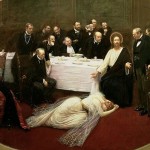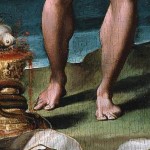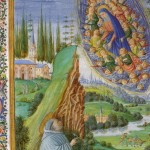
Jeremiah seemed to think so and that’s more interesting than a thousand vapid “current events” articles on gorillas.
Modern Christians have talked about the strange new world within the Bible at least since the time of Karl Barth. Actually, this trope goes back all the way back to one of Barth’s sources, Albert Schweitzer and his The Quest of the Historical Jesus. In that book the good humanist doctor “discovered” in Jesus an apocalyptic prophet-figure that didn’t play nice with the liberal-bourgeois Jesus of Troeltsch’s The Social Teaching of the Christian Churches.
But boy, if you look at the Old Testament then you realize how disturbing God could be for the prophets. The prophets were strange figures who demanded a fundamental transformation from their audiences. Perhaps none of them was as radical as Jeremiah. He would not have been a popular figure in any age. Jeremiah prophesied nothing less than the total destruction of Jerusalem as divine punishment for Israel’s unfaithfulness to God. Predicting famine, plundering by conquerors, and foreign exile doesn’t win too many popularity contests. Move over Westboro, there’s an old game in town.
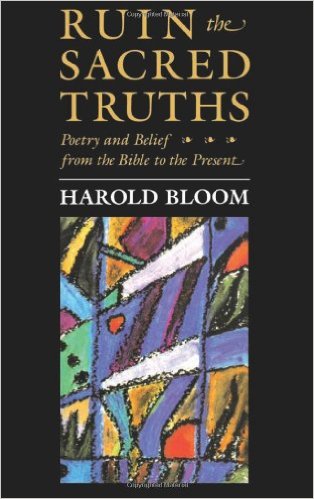 Thanks to Harold Bloom’s Ruin the Sacred Truths: Poetry and Belief from the Bible to the Present I suspect God probably wasn’t one of Jeremiah’s greatest fans either.
Thanks to Harold Bloom’s Ruin the Sacred Truths: Poetry and Belief from the Bible to the Present I suspect God probably wasn’t one of Jeremiah’s greatest fans either.
I’d like to draw some attention to Harold Bloom before we move onto Jeremiah. Bloom is one of the few critics in the secular academe who defiantly champions religious literature. A surprising number of the figures in my TOP10 Religious Novelists and Poets came to literary prominence thanks to Bloom’s criticism, because of his penchant for promoting overtly religious literature. You can glean some of the reasons for his habit from the following passage in Ruin the Sacred Truths:
I myself do not believe that secularization is itself a literary process. The scandal is the stubborn resistance of imaginative literature to the categories of sacred and secular. If you wish, you can insist that all high literature is secular, or, if you should desire it so, then all strong poetry is sacred. What I find incoherent is the judgment that some authentic literary art is more sacred or more secular than some other.
His unwillingness to separate the sacred from the secular has much in common with what recent scholarship notes as the hallmarks of a uniquely Catholic imagination. In this he is only perhaps equally by George Steiner, whose Real Presences brashly argues for the presence of God as the key for understanding all human efforts at meaning.
But let’s get back to the meaning of some really strange things said by Jeremiah. The standard translation of Jeremiah 20:7 hints at something odd:
You seduced me,* LORD, and I let myself be seduced; you were too strong for me, and you prevailed. All day long I am an object of laughter; everyone mocks me.
The explanatory note for “seduced me” reads, “Jeremiah accuses the Lord of having deceived him,” which is rather disappointing, because it doesn’t pick up on the violence of the rest of the verse. Ruin the Sacred Truths instead goes further, much further:
Starting with Chapter 2, Jeremiah’s oracles place a heavy emphasis upon the trope of Jerusalem as Yahweh’s unfaithful bride, his first wife as it were, to be replaced by the more reliable Jeremiah as second bride. I was to examine this trope more fully in a moment, but only after looking at the most extravagant and memorable passage in this extravagant and memorable interpreter of Yahweh, from the seventh verse of Chapter 20 on ward. Here the Hebrew needs to be read very slowly and thoroughly, because Jeremiah accuses Yahweh of sexual violence towards him, and accusation too serious and too original to be set aside as easily as many might wish.
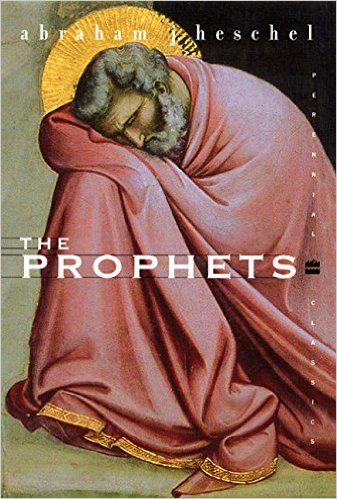 Here Bloom is relying on work previously done by the venerable Abraham Joshua Heschel in his widely-read book The Prophets:
Here Bloom is relying on work previously done by the venerable Abraham Joshua Heschel in his widely-read book The Prophets:
The words used by Jeremiah to describe the impact of God upon his life are identical with the terms for seduction and rape in the legal terminology of the Bible.
The words in question, according to Bloom, are as follows:
The crucial verbs are patah and chasack. In Exodus 22:16 patah refers to seducing “a maid that is not betrothed” before or without marriage. In Deuteronomy 22:15 chasack refers to sexual violence, and elsewhere to adulterous rape.
Therefore Bloom renders Jeremiah 20:7 in Ruin the Sacred Truths as:
Yahweh, you seduced me unlawfully, and I consented to being seduced; you raped me, and you were too strong for my resistance to prevail. All day long I have become an object of derision, everyone mocks me.
This is clearly a metaphor, since the prophets, more than the authors of the previous sections of the Hebrew Bible, criticized anthropomorphism.
Yet, even if it is “only” a metaphor, it is an especially pungent one that gives Jeremiah’s words a properly Rabelaisian Catholic punch, a punch bigger than any gorilla. “My ways are not your ways,” the prophet Isaiah quotes God.
That’s how strange the world of the Bible really is. I should add that all of this is predicated upon the fundamental nuptial metaphor (as already suggested by Bloom above) for the relationship between God and his people.
I will deign to explain why this is important for understanding why a Church that worships a celibate Messiah places so much emphasis upon marriage.
By the way, if you find all this offensive, all I can say is that it is in the Bible, just as the fact that Jesus was an anatomically correct male. Deal with it.
UPDATE: These are my own first reactions to this particular reading of Jeremiah. I refused to be bullied into making moralizing, but ultimately flaky, conclusions about it. I trust my readers, and maybe this is a fault of mine, to explore (or not!) the issues brought up here for themselves rather than ramming a “relevant” takeaway down their throats.
By the way, did you know that Jesus Didn’t Call God Daddy, or that Difference, Disharmony, and Drama Are the Essence of Marriage? Or, did you ever wonder . . Does Catholic Monasticism Have a Sexual Orientation?
Please consider making a donation to this blog through the donation button on the upper right side of its homepage.
Stay in touch! Like Cosmos the in Lost on Facebook:


